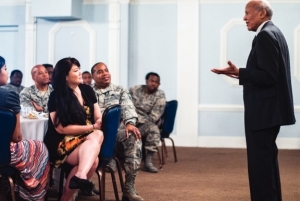Al King speaks at Seymour Johnson Air Force Base black history event
By Joey Pitchford
Published in News on March 1, 2017 10:07 AM

News-Argus/SETH COMBS
Al King, former Goldsboro mayor, speaks during a lunch honoring black history and heritage Tuesday.
Former Goldsboro mayor Al King is enjoying the third retirement of his life, but that doesn't mean he has nothing left to say.
Discrimination, perseverance and the value of family were a few of the things King spoke about Tuesday, as the guest speaker at Seymour Johnson Air Force Base's African-American Heritage Luncheon.
The luncheon was sponsored by the SJAFB African-American Heritage Committee. Committee president Tech Sgt. Aron Lee said having King at the event was important to help other African-American airmen get a sense for their direction in life.
"You're never going to know how to live your life without seeing how someone lived theirs," he said. "Maybe we can take some of the things he experienced and apply them to the things we've experienced."
King began his speech by detailing his time growing up in Mount Olive. As a young farm worker, King learned the value of hard work.
"I picked cotton, I cropped tobacco, whatever you did on a farm, I did it. And I loved it," he said. "I didn't know there was any other way of life."
His mother, who became the mother figure of her eight siblings after King's grandparents died, showed him the value of family.
"There has never been a better person on the face of this earth than my mom," he said. "I don't know of anyone else who could do what she did."
King, who served three terms as mayor from 2002 to 2015, is himself a retired Air Force Lieutenant Colonel. After becoming the first person in his family to graduate from college, he joined the Air Force in October of 1956.
Segregation and racism were still the law of the land, and King was often the only African-American officer on base. King said that he was confronted with discrimination as soon as he reported to his first assignment at Spangdahlem Air Force Base in Germany.
Meeting with his commander on base for the first time, King was greeted with hostility.
"His first conversation with me, me with him, he told me 'don't unpack your bags, because I don't think negroes' - and he didn't say negroes, he used the n-word, 'should be officers in the Air Force.'"
That was King's introduction to his commander, and to life as an African-American officer. His commander would go on to block his rise through the ranks, to the point where King did not make 1st Lieutenant on time.
Asking if the crowd knew anyone who had failed to make that rank on time, King got no reply.
King soon requested a transfer on the advice of a close friend, and received it. At that point, he was able to begin his climb up the ranks.
Eventually, King ended up stationed at George Air Force Base in California. While there, he struck up a friendship with fellow airman Fred Rowland, and the two spent time traveling across the state in King's car.
When the wing received orders to relocate to Florida during the Cuban Missile Crisis, King and Rowland traveled together.
Along the way, the two stopped at a drive-in restaurant for some food. When, after ordering, Rowland asked King what he wanted to eat, the waitress told them "we don't serve him."
The two left without eating. Instead, the went to look for a hotel to stay the night in. Again, King was denied.
"About this time, Fred was getting frustrated," King said. "We go about two or three more miles, nobody said anything, and then he turns to me and goes "Al, you know I forgot you were black."
At the next hotel, King came up with a plan. Sending Rowland in first, King posed as his chauffeur, which was enough to get him a room.
"I couldn't get a room as Al King the black guy," he said. "But I could as the chauffeur for the white guy."
King went on to serve in Vietnam, before retiring from the Air Force in 1976. He joined the city of Goldsboro as director of personnel and safety in 1979, retiring in 2000 before beginning his stint as mayor.
Through the struggles he endured, King said he never felt like he things were hopeless. In Vietnam, he was confident he would come home, even as rockets pounded his camp every day and his convoys were forced to drive through repeated ambushes.
His confidence, he said, came from knowing who he was and where he wanted to go.
"If you don't know who you are, you will become anyone," he said.
